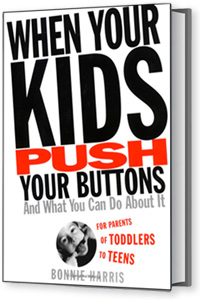New-found Independence
 Q. My 3 ½ yr. old son has on ongoing heart condition that he was born with that is being controlled by daily medication (morning, afternoon & evening). He is very bright and articulate and has always been amazing at taking his drugs but over the last few weeks his independence (and determination) has increased tenfold, and he is asserting his authority by refusing to take his drugs.
Q. My 3 ½ yr. old son has on ongoing heart condition that he was born with that is being controlled by daily medication (morning, afternoon & evening). He is very bright and articulate and has always been amazing at taking his drugs but over the last few weeks his independence (and determination) has increased tenfold, and he is asserting his authority by refusing to take his drugs.
I have tried everything – asking politely and explaining why he must take them, bribery, and then out of sheer panic (these are life saving drugs), yelling and forcing the drugs into him and preventing him spitting them out by restraining him! I know this is totally wrong but it gets to the point where there is no other option. After trying for an hour without success and by the time we have forced him we are all very upset and very late for nursery school and very late for work… and this is every day. How can I manage this better and just get him to agree to take them?
A. In his new-found independence, your son needs more power over himself—could be simply age related, could be that he feels powerless in other aspects of his life, and he’s “getting back”. Regardless, he must take his medication, and I empathize with your struggle. He needs your understanding that he doesn’t like being forced to do something and in this area, he knows how to resist.
First, at a time separate from when he must take the medicine, when he is in a good mood, tell him you have a problem you need his help with. Then let him know that you are having a hard time dealing with his medication, that you know that it is something he doesn’t like being forced to do. Tell him you know he would much rather not have a problem with his heart and that of course he doesn’t want to take the medicine because he’s just a kid. Let him know that’s why he has a mom. It’s your job to make sure he is healthy and taken care of and does important things that he doesn’t want to until he is old enough to take care of that for himself.
So since it is your job, you are asking for his help. Then ask him what he thinks you could do to make it as easy for him as possible. Would he like to take it before or after breakfast? (If time of day doesn’t matter, let him choose that.) Would it be better to have it with juice or water? Does he want you to hand him the pills or would he rather take them out of the bottle himself? There are any number of choices you can give him.
The point is to give him power over the process. When my 4 yo daughter had to wear glasses we went through a tough time. She hated her eye doctor and was considering refusing to go. I told her she didn’t have a choice about going but she did have a choice about how she felt about it. I suggested that she could not like her doctor and be grumpy with him and not talk to him—that that would be okay. Or she could decide that she would take the best care of her eyes because they belonged to her and nobody else and she would need them to be in the best shape possible to help her.
She thought about it for a while and then decided that she would be ok with going to the doctor. She was a trooper after that. It didn’t hurt that at one point I genuinely broke down crying and told her how very sorry I was that she had to wear glasses. She came over and gave me a hug and told me it would be okay. You could try the same. The important piece, especially if he is a determined, strong willed child, is that he finds a way to make the process his within your necessary parameters.
Conflicting Agendas
 Q. My 9 year old daughter has a temperament where she doesn’t like to be told what to do, and so often won’t come inside the first time I ask her (it takes 13 nagging reminders!) then I have to get stern and she doesn’t like that. How would you handle that? Especially when other family members’ watchful eyes are upon you and they make interfering comments?
Q. My 9 year old daughter has a temperament where she doesn’t like to be told what to do, and so often won’t come inside the first time I ask her (it takes 13 nagging reminders!) then I have to get stern and she doesn’t like that. How would you handle that? Especially when other family members’ watchful eyes are upon you and they make interfering comments?
A. I assume “stern” includes frustrated yelling and threatening as opposed to firm, which embodies calm authority and self-confidence. We are so embedded in the principles of sternness when it comes to children as if they are wild animals that must be tamed. You are the one who chooses to nag 13 times, probably channeling the watchful family member and then unintentionally blame your child for making that happen. Your daughter has learned that she doesn’t need to listen the first 12 times. Be firm and confident the first time.
Your desire to have her come in is just as important as her desire to stay out. Two conflicting agendas, each as equally important to its owner. Sometime at an unrelated time, let her know calmly and without blame that you want to work out an agreement with her about coming in when you call her that works for both of you. She will feel less like being forced when you acknowledge her agenda with respect. “Of course you want to stay out and play. I would too if I were you. At a certain point, I want you to come in. In the past, we have gotten into a struggle about it that neither of us likes. How can we make this work so we both get what we want?” If she says, ‘let me come in when I want’, say calmly, “Of course that’s what you want. That choice doesn’t work for me. Let’s find something that will work for both of us?” The fairness and logic of this will appeal to her as well as the challenge of finding a solution—something you both need to come to it together. When she trusts that you are not going to make her lose, she is more likely to rise to the occasion. But then, don’t expect success right away. When coming up with the plan add, “What should we do if you forget and still don’t want to come in?”
You will likely need to remind her of the agreement and follow through. That is usually where we fall short. Remind her she has a choice to come on her own or by plan B. Just stay calm, say little, and DO NOT engage in a power struggle. Your persistence with sticking to your agreement will eventually work as long as she initially feels it is fair. Also try motivating instead of threatening: “As soon as you come in you can have a snack”, instead of, “If you don’t come in now there will be no TV tonight.” (also read my answer to the first question).
Making Friends
 Q. My eldest son of three is almost 13 and has always had difficulties making friends. He’s a great person often thinking of others and pleasing his parents, and seems to have deeper insight into events, music, animals, art, etc. more than most his age, who are more interested in peers and sports. He’s very much an independent soul, having his own thoughts and opinions. He’s always been on the sensitive side and feedback over the years has taught him to hold much of his feelings deep inside. As a result, when he does express himself it’s usually when feelings boil over.
Q. My eldest son of three is almost 13 and has always had difficulties making friends. He’s a great person often thinking of others and pleasing his parents, and seems to have deeper insight into events, music, animals, art, etc. more than most his age, who are more interested in peers and sports. He’s very much an independent soul, having his own thoughts and opinions. He’s always been on the sensitive side and feedback over the years has taught him to hold much of his feelings deep inside. As a result, when he does express himself it’s usually when feelings boil over.
My concern is that at 13, he says he has no friends. It bothered him more over the past 3 years, but this year he says he’s learned that he does better in groups rather than 1:1, and he’s accepted this about himself. Normally I’m good with it if he is, however I know it bothers him (esp when his younger brother has multiple friends over), and I’m not sure if I should let him work this out on his own or what kind of training or direction I could lead him in.
I don’t want to look back and regret not intervening at a critical time in his childhood for developing basic socialization skills he’ll need for adulthood, if I even could impact such. My fear… he might shut himself off from 1:1 relationships or ever develop meaningful friendships which I’ve learned are essential in life. Is this just me or should some subtle or more assertive interventions occur?
A. It sounds like you have a wonderful son, and your question is so thoughtful and caring. As parents it’s very hard to see our children unhappy over big issues and we easily catastrophize into a future alone and friendless. Your son sounds a lot like my daughter who took a long time to find like-minded friends who really got her. My advice is to trust in your son’s process. He does not need to be socialized; no child does. We are human beings and are evolved for living in groups. There is no direction to push him in and certainly no training to provide. The hardest part for you is to acknowledge and support his frustration over not yet finding his groove. He will. And to know that his process is his process.
The biggest mistake most parents make is to try to make him feel better. Usually we end up doing the opposite. Your job is to hear his frustration and give him good reason to be able to talk to you about his feelings. He won’t when he thinks his feelings will upset you or will make you try to do something about it. Many teens who are sensitive, creative, independent and introverted have little or no real friends through high school. He will blossom when he gets with his kind of people. Your job is to support him in that confidence and patience. He has learned to deal with it for now. He probably feels safer in larger groups as he can do more observing and less inter-acting as most others do not share his interests. He knows he’s different and would rather not stand out. But when he feels confident in a friend, he will be fine.
I would also talk with him about feelings of envy or resentment he may have toward his brother for whom it is easy to make friends—different temperaments. If you acknowledge that, he will learn that you really do get it. Just letting that out is often helpful. Is he involved in any extra curricular art or music programs? Does he play an instrument? Solo sports may interest him like swimming or skiing. It sounds like you have a strong relationship. Maintain that, admire and acknowledge his intuitive nature and assure him he will find his path and his group of friends—it may just take time. In the meantime, he has a strong base at home, which will serve him well.
To submit a question, email me at bh@bonnieharris.com with your short question and I will answer you within a few days. It may appear in the newsletter at a later date.

We punish our children in an attempt to keep them from pushing our buttons, often escalating the original problem into a cycle of anger and blame. When Your Kids Push Your Buttons is not about what to do to your kids to get them to stop pushing your buttons. This book is about how to be the parent you wish you could be-the parent that only you are holding yourself back from.







